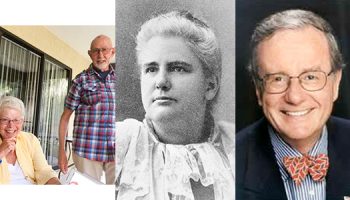Each year, at the end of the season, five Chautauquans are honored for their service and dedication to the Institution. What all of them, living or dead, have in common is the love and respect of the community on which they have made a significant mark.
The 12th annual Giants of Chautauqua honors will be held at 3:30 p.m. Friday, Aug. 24, in the Hall of Philosophy, the last presentation of the season in the Oliver Archives Heritage Lecture Series.
Jon Schmitz, the Institution’s archivist and historian, chooses the five honorees with the input of other Chautauquans. Five prominent members of the community speak about the accomplishments of the inductees. No one may be honored more than once.
This year’s honorees are:
Joan Smith
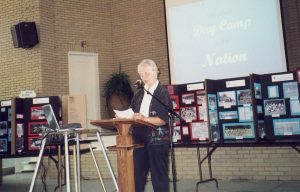
Joan Smith is a longtime Chautauquan and year-round resident known for her photography and photojournalism in the Daily. A collection of her work is housed in the Oliver Archives Center, the Institution’s repository for documents and historical artifacts, to which she has been an active supporter.
And Smith has collected her own treasure trove of Chautauquabilia in her cottage as part of her passion for preservation. That passion ranges from the Institution’s grounds and gardens to its aging plaques and memorials to its trees.
“She loves trees and, I believe, once said that there was never a good reason to cut down a tree,” said Schmitz, who described Smith as persistent, but always polite.
And while Smith has certainly left a visible, appreciable effect on Chautauqua, she has had an even bigger impact on the thousands of children whom she taught and nurtured at Children’s School, where she worked for many years.
Marlie Bendiksen, a longtime friend, will honor and introduce Smith.
Theodore Flood
Theodore Flood was a Chautauquan from the beginning.
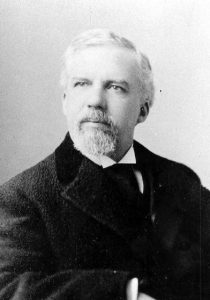
A Methodist minister from Jamestown, Flood was the right-hand man of John Heyl Vincent, who with Lewis Miller founded the Chautauqua Lake Sunday School Assembly in 1874. He had a knack for marketing and public relations.
Hoping to build on the success of Chautauqua’s first year, Vincent turned to Flood to help raise its profile by attracting a celebrated person for its second season. After much deliberation, they chose President Ulysses S. Grant, who had been one of Vincent’s parishioners in Galena, Illinois.
Grant agreed to visit, and while he said virtually nothing in his two days here, his presence drew national news coverage that made the name Chautauqua resonate far and wide.
This marked the beginning of Flood’s career as the Institution’s most tireless booster. He went on to found the Chautauqua Assembly Daily Herald (now The Chautauquan Daily) and the monthly Chautauquan magazine, for which he served as editor and publisher. He also set up a printing plant in Meadville, Pennsylvania, which published and distributed the books on the reading list of the Chautauqua Literary and Scientific Circle, which many consider America’s first book club.
In the 1890s, Flood fell out of favor with Vincent’s son, George, and retired to Meadville, where he died 16 years later, having never returned to his beloved Institution.
“He put Chautauqua on the map,” Richard Heitzenrater, the William Kellon Quick Professor Emeritus of Church History and Wesley Studies at Duke Divinity School, said earlier this summer. Heitzenrater, a longtime Chautauquan who discussed Flood for a Heritage Lecture earlier this month, will induct Flood.
Theodore Miller
Theodore Miller, the son of Lewis Miller, the Institution’s co-founder, was the ultimate golden boy.
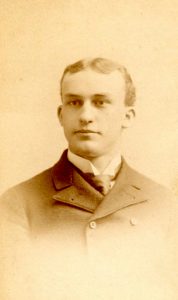
He was born in Akron, Ohio, in 1874 and grew up on the Miller family’s estate, but his summers were spent at Chautauqua, where he was active in sports and competed in rowing on the lake.
In 1898, Theodore Miller was 24 years old. A Yale graduate, he was rich, handsome, popular, athletic and well-connected. The world was wide open to him, but what he really wanted was to be a soldier. He got his chance that year when the United States went to war with Spain over Spain’s harsh rule in Cuba and the sinking of the American battleship U.S.S. Maine in Havana Harbor.
Lewis Miller used his influence to secure an officer’s position for his son, but young “Thede,” as he was called, rejected it to join Theodore Roosevelt’s Rough Riders, an adventurous group of college boys and cowboys.
“What I want to do is to get into the scrap and be able to do something worth doing,” the younger Miller wrote to his father. “I may be too eager and ambitious, but that is what I want to do.”
He shipped off to Cuba that June. In the Battle of San Juan Hill, Miller’s spine was severed by a bullet. He was taken to nearby field hospital five miles away, but died several days later on July 8. It was one of the only summers he had not visited Chautauqua.
Schmitz will tell his story.
Edward Everett Hale
Edward Everett Hale was born in 1822 into a prominent New England family. His father was the editor of the Boston Daily Advertiser newspaper; his uncle was the orator and diplomat Edward
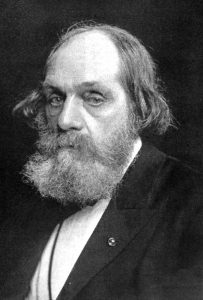
Everett, and his grand-uncle was Nathan Hale, the American spy hanged by the British during the Revolutionary War. Hale graduated from Harvard at 17, became a minister and went on to help found the Unitarian Church of America. He also served as chaplain of the United States Senate.
A prominent writer and public intellectual of his time, Hale is best known for his short story, “The Man Without a Country.” Written during the Civil War, it tells the story of Philip Nolan, a accomplice of Aaron Burr who is tried for treason. At his trial, Nolan blurts out: “I wish I may never hear of the United States again!”
A judge granted this request by sentencing Nolan to spend his life at sea, never touching American soil and forbidden from ever hearing the name of his nation. This “separation from the Union” utterly destroyed him.
Hale was also a vital presence at Chautauqua, where he lectured extensively, wrote books for the CLSC, helped establish a Unitarian House at the Institution in 1906 and advocated a nondenominational commitment to lifelong learning and civic dialogue.
The religious organization International Order of the King’s Daughters and Sons, which still has houses on Vincent, were inspired by his writings.
Bob Hopper, a former United States Foreign Service officer, history aficionado and former president of the Unitarian Universalist Fellowship, will describe Hale’s contributions.
Barbara Vackar
Barbara Vackar made her name as a champion of women’s rights in her home state of Texas and as a special assistant to President Jimmy Carter, focused on trying to pass the Equal Rights Amendment.
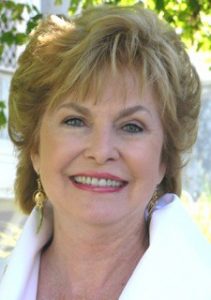
A graduate of Texas State University, Vackar worked at the University of Texas at Austin and became a fixture at the state capital there, lobbying legislators to support programs to benefit women.
She first came to Chautauqua in 1996, but quickly plunged into the heart of the community, spending the next 21 summers here. As president of the Chautauqua Women’s Club from 2005 to 2010, Vackar infused the organization with her contagious enthusiasm. She oversaw a capital campaign to fund the remodeling of the CWC House, reorganized its board of directors, and set a new direction for programming.
She also booked dozens of speakers into the Hall of Philosophy and, in 2015, the CWC honored her by establishing the Barbara Vackar Lecture Series as part of its Contemporary Issues Forum.
“The magic of Chautauqua grabbed her and did not let go,” the Austin American Statesman wrote in a lengthy obituary after Vackar died last November. “The mix of intellectual ideas, political discussion, and ever present sensibility of artists in residence in opera, symphony, visual arts, ballet, and theatre were like a siren song for her.”
As if that were not enough, she also became a master gardener, an accomplished watercolorist and a floral designer.
Virginia DiPucci, member of the CWC, former president of Chautauqua Opera Guild and a longtime friend, will discuss Vackar’s incredibly rich and full life.
“She was a real Renaissance woman,” DiPucci said. “She was so many people wrapped up in one body. A brilliant leader and politically savvy, yet she had the warmest heart around. She brought us forward into a new realm.”



